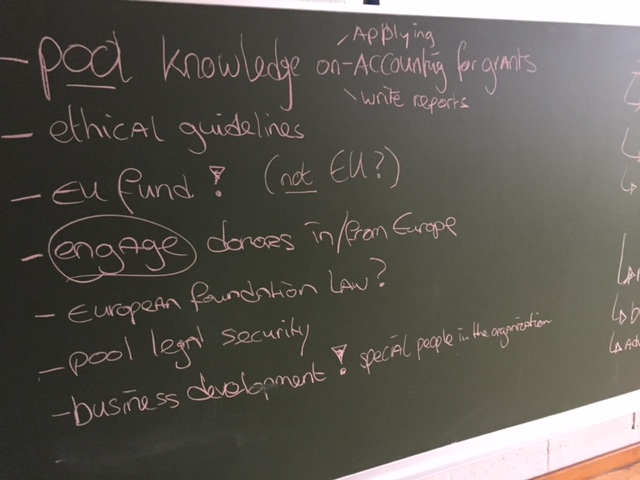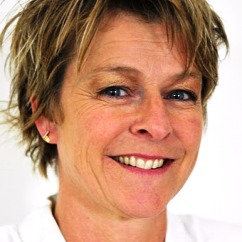

Brussels Brainstorming: Media Start-Ups Share Strategies
Journalism start-ups from across Europe gathered at DataHarvest 2015 in Brussels on May 8, for a roundtable discussion on possible cooperation and collective needs. With journalism increasingly seeking new business models and investigations coming out of non-traditional outlets, there is much to gain by fledgling publishing platforms, investigative centers, and nonprofit organizations in sharing knowledge and strategies.

DataHarvest began in 2008 as a get-together on European farm subsidy data; it now attracts hundreds of investigative journalists across Europe.
GIJN board member Nils Mulvad kicked off the talk before over 50 participants by showing what the Global Investigative Journalism Network already offers in studies and resources for both profit and non-profit start-ups. He touched on two areas in which start-ups can assist each other: pooling knowledge on how to apply for grants, and sharing models for efficient reporting back to donors.
Then followed brief presentations by people from organizations, platforms, and outlets from Ireland to Moldova. Among the groups represented at the forum were Germany’s Correct!v, Hungary’s Direkt36, Italy’s IRPI, Latvia’s Re:Baltica, Moldova’s LaEtaj.md, Norway’s Oslo Business Memo, Romania’s The Sponge, and the EU Observer.
Brevity forced them to focus on what to bring to the table in tips and requests. All were generous in sharing experiences, pointing out strengths and weaknesses, and asking each other the tough questions on how to assure sustainability of investigative and data journalism.
A major focus was how to move from grants to business revenue. Supplying data from journalism research to NGOs, companies, and other journalists across borders could be a small source of extra income to a center, panelists said. Teaching investigative skills might help, as well. Also, negotiating a retainer fee for reporting and research could help, instead of receiving “fixers” fees that are notoriously low. Some centers, such as Re:baltica (focusing on the Baltic states), charge for research done, said Sanita Jemberga from the Riga-based investigative platform.

More than 300 journalists convergred on Brussels for DataHarvest 2015, the European Investigative Journalism Conference. Credit: Nils Mulvad.
But Jemberga also warned of being over-optimistic on this. Research on request can only supply small amounts of money. As can crowdfunding, although fundraising locally for local stories has helped Re:baltica get certain investigations off the ground.
A good way of showing what your platform can do — and thus attract donors — is publishing in English, added Andras Pethö of Direkt36, a five-month-old start-up from Hungary. Direkt36’s investigations get picked up elsewhere because it includes an English edition.
Lisbeth Kirk, from — in this company — relatively “old hand” EUObserver, summed up several possibilities to expand impact and diversify sources of income. Added to by Investigative Reporting Project Italy (IRPI) and Germany-based Correct!v, a handsome list of strategies evolved, including building research tools for a fee, developing innovative forms and formats (from long-reads and interactive websites to news games) that can be “exported,” being a consultant to other start-ups, cutting housing costs through using a virtual newsroom, and sharing knowledge on drawing incidental readers into a membership structure based on flat or flexible fees.
The participants then identified other activities where start-ups could connect and thus could make a difference. “There is no such thing as a European foundation law,” said Kirk, forcing foundations to deal with different, national rules each time they want to support a cause. For instance, in Germany no foundation money can go to journalism projects, explained Correct!v’s Daniel Drepper. “But it can go to education, and thus we labeled ourselves an educational institution,” he said. Providing Europe with common foundations law might entice foundations into spending on journalism. “We have to collectively engage the donors,” added Kirk.
“Also, there is no (EU) fund for investigative journalism, while there are EU funds for creative industries such as film or for education,” Re:Baltica’s Jemberska reminded the crowd. Standing united, start-ups might be able to press the need for more funds, as well as identify and engage large donors in Europe. “And then perhaps invite them to come to the next DataHarvest,” was a suggestion from the audience. Pooling legal experience might be another area where start-ups could benefit from each other.
When Mark Lee Hunter (INSEAD, and scholar of business and stakeholder models in journalism) asked which start-ups in the audience had an employee devoted to developing business strategies, only a few hands went up, among them Correct!v. Drepper said Correct!v even has three people working on new models. But it is a task start-ups mostly leave unattended.

DataHarvest was hosted by GIJN member journalismfund.eu, the European Fund for Investigative Journalism in Brussels.
Sadly so, Gavin Sheridan pointed out. He told the audience about his most successful endeavor so far: Storyful. “I was first employee, then director of innovation, and then sold it to NewsCorp. And now I am working on a new project: Vizlegal, a tool for legal research. It will be the best legal website ever!” he said, explaining that identifying a niche and thinking in creative possibilities instead of counting obstacles had brought him far. After which Moldova’s Dumitru Lazur showed his platform LaEtaj.md: a niche publication where research into property ownership provides much needed transparency with useful property information for (soon to be paying) customers.
Dag Yngland from Oslo Business Memo ended the session on an upbeat note. “We started OBM over 12 years ago, and I know these small start-up, niche-oriented models work,” he said. “Just keep learning from each other, from the success of others outside our profession, and believe your journalism can make a difference.”
Running out of time and blackboard space to list tips and ideas on, GIJN board member Margo Smit concluded that the need for gatherings like this, where start-ups can share, stumble and learn, was evident. This session was packed with practical and useful ideas, and strategies to be tried. At the Global Investigative Journalism Conference in Lillehammer, Norway, this October, additional sessions on these topics will certainly be included. In the meantime, DataHarvest organizer Journalismfund.eu provided conference goers with each other’s contact details. So the networking can continue online, and considerations on the need for a collective resource platform for European start-ups can be shared.
 Margo Smit is an investigative journalist, journalism teacher, and director of VVOJ, the Dutch-Flemish Association of Investigative Journalists. She is has produced documentaries in Dutch and English on such subjects as nuclear proliferation, the EU, counterfeiting, and banking. She is vice-chair of the GIJN board of directors.
Margo Smit is an investigative journalist, journalism teacher, and director of VVOJ, the Dutch-Flemish Association of Investigative Journalists. She is has produced documentaries in Dutch and English on such subjects as nuclear proliferation, the EU, counterfeiting, and banking. She is vice-chair of the GIJN board of directors.










